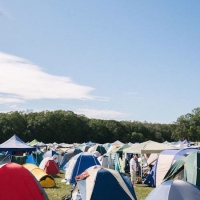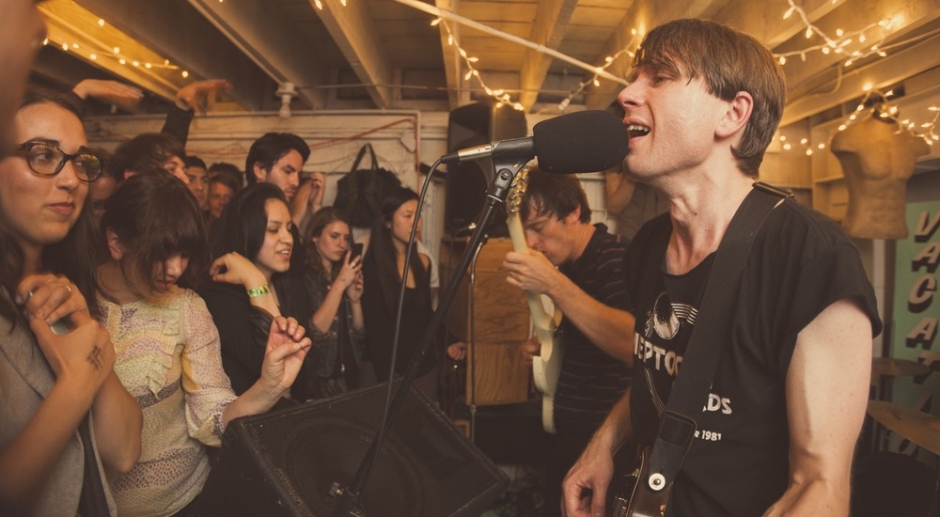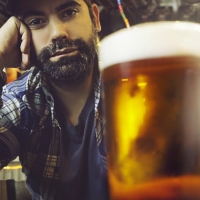 How To Make Camping At Music Festivals Less HeinousA tried-and-tested guide to get you from unhappy camper to amateur adventurer.
How To Make Camping At Music Festivals Less HeinousA tried-and-tested guide to get you from unhappy camper to amateur adventurer.

House Shows - The Uber/AirBnB of Live Music
Our growing love for live music in backyards and basements.
Header image via Myleen Hollero Photography.
Words by Ethan Andrews.
In the early 20th century, speakeasy bars were the thirsty American’s solution to Prohibition. A century later and although drinking laws have relaxed (if you don’t live in Sydney or Brisbane, I guess), the appeal of secret addresses, passwords and an invite-only guest list remains.
Being cynical about another dimly lit dive with a retro fit out is easy though. The legitimate counterculture of speakeasies has since moved on, with a combination of red tape, dissatisfaction and opportunism fuelling another kind of underground nightlife. It won’t flood your Instagram feed, because it travels through word of mouth and on black and white flyers. In the homes of punters on the artistic fringe all over the world, the humble house show is kicking on.
Forget your preconceptions. House shows aren’t just for the otherwise unbookables cutting their teeth before an audience. Established artists are now supplementing their shows in traditional venues with basement and lounge room gigs, giving audiences a uniquely intimate experience and taking on a kind of creative control that cannot be found in a place pushing beer specials.
Newcastle musician Spencer Scott started playing house shows not in revolt against pubs and clubs, but because his band mates were hosting a party anyway.
“A lot of DIY ethics come into that. If you can’t find a venue to play at or if you don’t have a place to put on this show, you can put it on in your house. That’s totally an option.”
From similar sentiments New South Wales harbour city has sprouted an entire community of house shows. A tour spot often overlooked by bands, Newcastle took a hands on approach to booking acts from out of town, with bookers running one off shows in the suburbs and building scenes around stalwart house venues like The Fishbowl and Hudson Half Pipe.
“House shows are creating alternatives to what we already subscribe to” says Scott. “I’ve done house shows in a punk band and as an acoustic artist. The punk ones have been big parties and get a bit loose but the acoustic ones really go the opposite way; it’s quite quiet and intimate.”
The growing trend of playing sets in houses isn’t just for musicians though. Across the Pacific the Los Angeles comedy scene has embraced house shows as a way to cope with market saturation. In a city with unending options for world class entertainment, to stand out you’ve got to offer something different. This has seen some of the city’s most beloved stand up shows pop up in the back rooms of comic book stores, above Chinese restaurants and between the aisles in sex shops. When arguably the greatest comedy scene in the world has already spread so far outside of traditional venues, the only real estate left unchartered is residential. Growing numbers of house shows even spawned a Comedy Central series, Adam Devine’s House Party, which sees comics perform in the Workaholics star’s faux-backyard kegger.
This puts house shows in a complex no man’s land. The appeal is big enough to turn the heads of TV producers but their life expectancy is still as unpredictable as the tenants who occupy them. When residents grow up or fall in love, attics start to house Christmas lights and backyards become less an artsy hangout, more a place to hang washing out.
Though individual venues come and go, the community of house shows is growing. And branching out too, spreading from their spiritual home in dingy squats and share houses to the verandas of middle class suburbia. Websites such as Home Made Jam, Do DIY and Parlour Gigs are leading the charge to make performing at house shows a sustainable part of an artists’ career. Acting as house show encyclopaedias, performers are directly connected to venues, making interstate and international tours a reality.
They also aim to ensure such irregular gigs don’t have to come with an irregular pay check. In a conversation on ABC Radio National’s The Drawing Room, Parlour founder Matt Walters said “Live music provides $1.2 billion into the Australian economy every year, but very little of that money actually ends up in the hands of musicians. What we want to do with Parlour is make that connection [between artist and audience] more streamlined.”
Fans have come to accept platforms like Kickstarter and Patreon as part and parcel of a creative career. House shows are a little different. There is an inevitable awkwardness that comes with paying a cover charge for a mates’ party. But then, Uber and Airbnb felt weird at first, too. Now they rival the price of alternatives and deliver a superior, more personalised product. Giving your ticket fees straight to an entertainer – not a sound guy or bouncer – and seeing a house show does the same.
 How To Make Camping At Music Festivals Less HeinousA tried-and-tested guide to get you from unhappy camper to amateur adventurer.
How To Make Camping At Music Festivals Less HeinousA tried-and-tested guide to get you from unhappy camper to amateur adventurer.
 The Resurgence of Shit BeerHave cheap, nasty brews replaced trendy craft drops?
The Resurgence of Shit BeerHave cheap, nasty brews replaced trendy craft drops?